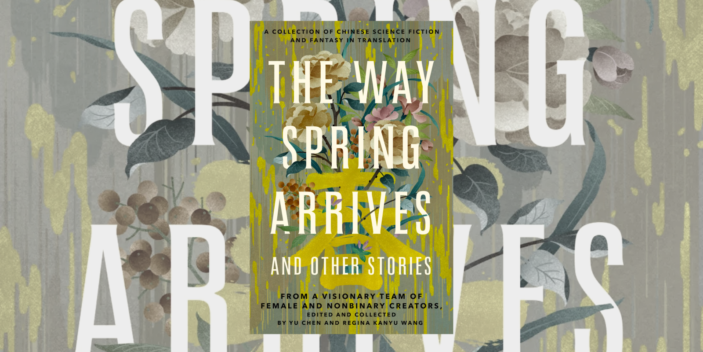
The Way Spring Arrives and Other Stories is a beautiful, intelligent and poignant collection of science fiction and fantasy short stories and essays by Chinese women and non-binary creators, edited by Yu Chen and Regina Kanyu Wang. The stories range from the fantastic to fable-like, with writing voices and styles that at times feel more modern while others evoke a more traditional storytelling feel. Interspersed essays then draw attention to the subtleties and considerations of the stories, the genre and the language in which they were written.
The collection opens with the hauntingly beautiful “The Stars We Raised” by Xiu Xinyu, translated by Judy Yi Zhou. This story, filled with charming and gentle imagery, is bittersweet and almost nostalgic. It’s about a young boy who is bullied, told from the point of view of another child in town. It explores the things we hold onto for strength, the things we ignore when we see others in pain, about growing up and about the regrets we have as adults. But there is also something about the way it is written, perhaps in the imagery of the stars, that is hopeful. It reminded me of Shane Koyzcan’s poem “To This Day”.
Upon reflection, it is the perfect way to open such an explosive collection. As the essays pull apart the genre, linguistic, translation and gender boundaries within which the contributors work. There is a sense that they are battling to be heard. And yet the collection repeatedly gives a sense of calm, of beauty, of patience, and above all, hope. It highlights the skill and the creativity of all the contributors including the translators, and in a subtle and gentle way, compels you continue paying attention.
Perhaps my favourite story of the collection is the clever, witty and delightful flash fiction story “What Does the Fox Say?” by Xia Jia. The story is a discussion on the boundaries of art and artificial intelligence, with a program drawing from various classics such as The Little Prince, Alice in Wonderland, and The Lord of the Rings to create its own story. The play on words and the reference to classic literature evokes a sense of nostalgia as the reader is asked to consider the role of technology in art and understanding.
The author notes at the end of the story how, as someone who writes in English as a non-native speaker, they often rely on AI, translation tools and search engines to understand and engage with literature. They ponder the impact it has on their interpretation of what they read. After all, literal translations often don’t alert the reader to the historical, tonal and cultural messages that underly particular phrases or the choice in how the message is conveyed. That this story appears so early in the collection brings the readers attention to the nature of the book they’re reading – a collection of translated works – and how it is therefore approached as a reader.
Admittedly my own personal interests drew me particularly to the essays and stories that examined translation theory. Rebecca F. Kuang’s essay “Writing and Translation: A Hundred Technical Tricks” was fascinating as she discussed how translation work had impacted her own writing; how it has made her think critically about the role of translation. Do translators bring authors to the readers, or readers to the author? She also muses on traditional translation debates and how globalisation has changed the way those debates can be interpreted. This essay is the perfect way to close the collection as readers are left to ruminate on the role of the translator in literature and the challenges of making ourselves understood across languages, especially when relying on someone else to help us convey meaning.
There are so many wonderful stories and essays in this collection that to only mention three feels like I’m doing it a disservice and yet if I were to start naming more that I loved I would end up naming them all. Each and every story and essay is filled with ideas, imagery and mastery of the craft that left me needing to contemplate each in their own time. This is a sensational collection that showcases the creativity, passion and sheer scope of sci-fi and fantasy work from Chinese femme and non-binary authors available to read. This will be a book I return to again and again.
![]()
![]()
![]()
![]()
![]()
FIVE STARS (OUT OF FIVE)
The Way Spring Arrives and Other Stories is available now from TorDotCom. Grab yourself a copy from Booktopia HERE.
